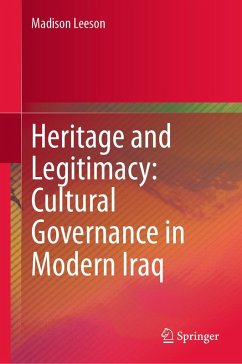This research offers a historical analysis of cultural projects and programs in Iraq to consider the sociopolitical conditions that shaped their governance. The material included this book is based on previously unpublished archives from the Ottoman Prime Ministry Archives, Middle East and North African Newspapers Collection, and UNESCO Archives, among other repositories. The work addresses a gap in scholarship which has neglected the role of cultural governance in heritage management and development in Iraq. The primary audience is academic scholars, historians, and educational institutions although the book will also be of interest to individuals in Iraq, in the Iraqi diaspora abroad, and those with a general interest in modern Middle East studies.
Dieser Download kann aus rechtlichen Gründen nur mit Rechnungsadresse in A, B, BG, CY, CZ, D, DK, EW, E, FIN, F, GR, HR, H, IRL, I, LT, L, LR, M, NL, PL, P, R, S, SLO, SK ausgeliefert werden.









